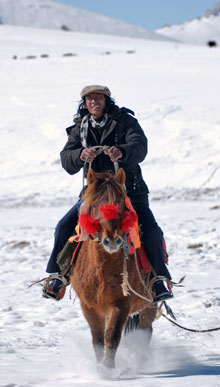Related resources

From Qinghai Province to Western Canada
Summary of three‐week study tour to Canada, co‐hosted by Parks Canada and Plateau Perspectives Canada, with focus on protected area management, human‐wildlife conflict, environmental awareness and the development of community tourism
From the Tibetan Plateau to the National Parks of Western Canada
IUCN-WCPA, March 2011 - In September 2010, Plateau Perspectives organized and co-hosted with Parks Canada a study tour to visit and learn from the experiences of four national parks in Alberta and British Columbia, as well as from several First Nations communities, local ranchers, Thompson Rivers University, and local tourism operations. Delegates included leaders from China's recently established Sanjiangyuan National Nature Reserve (153,000 km2), the Government of Yushu Tibetan Autonomous Region in southwest Qinghai Province (near the centre of the Tibetan Plateau), a couple of Tibetan university researchers, and one community representative. The main focus of the study tour was to learn and apply to the Tibetan Plateau context -- with its high grasslands and mountains, new protected areas, and sparsely populated landscape -- key lessons about protected area management, conservation research, community-based tourism, and relations with indigenous communities (cf. multi-stakeholder engagement).
The study tour was followed by a strategic Yushu International Ecotourism Workshop in November 2010 in Xining, the capital of Qinghai Province, to promote regional tourism that benefits local Tibetan communities in Yushu prefecture, both in and outside of the nature reserve. Active participants in the meeting included delegates from Tibetan herding communities, local tour operators, the tourism bureau, and colleagues from Qinghai Normal University. Special advice and experience was also gained from two invited delegates from Mongolia (from PCC Mongolia, and a herding community in South Gobi) and another from the United Kingdom (from Durrell Institute of Conservation & Ecology, University of Kent). These projects were led by Plateau Perspectives, an international non-profit organization that has worked in the Tibetan Plateau region for more than a decade. Funders included the Norwegian Agency for Development (NORAD) through a Norwegian partner organization, the Ford Foundation, and the Swiss Embassy and Canadian Embassy in Beijing.